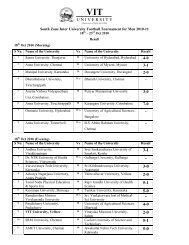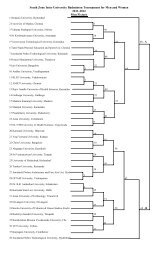- Page 3: This page intentionally left blank
- Page 6 and 7: In loving memory of my revered fath
- Page 8 and 9: Preface to the Second Edition vii P
- Page 10 and 11: Preface to the First Edition ix Pre
- Page 12 and 13: Contents xi Contents Preface to the
- Page 14 and 15: Contents xiii Selection of Appropri
- Page 16 and 17: Contents xv ANOVA in Latin-Square D
- Page 18 and 19: Research Methodology: An Introducti
- Page 20 and 21: Research Methodology: An Introducti
- Page 22 and 23: Research Methodology: An Introducti
- Page 24 and 25: Research Methodology: An Introducti
- Page 26 and 27: Research Methodology: An Introducti
- Page 28 and 29: Define research problem I Review th
- Page 30 and 31: Research Methodology: An Introducti
- Page 32 and 33: Research Methodology: An Introducti
- Page 36 and 37: Research Methodology: An Introducti
- Page 38 and 39: Research Methodology: An Introducti
- Page 40 and 41: Research Methodology: An Introducti
- Page 42 and 43: Defining the Research Problem 25 Ov
- Page 44 and 45: Defining the Research Problem 27 so
- Page 46 and 47: Defining the Research Problem 29 (a
- Page 48 and 49: Research Design 31 MEANING OF RESEA
- Page 50 and 51: Research Design 33 FEATURES OF A GO
- Page 52 and 53: Research Design 35 of students and
- Page 54 and 55: Research Design 37 Now, what sort o
- Page 56 and 57: Research Design 39 The difference b
- Page 58 and 59: Research Design 41 Important Experi
- Page 60 and 61: Research Design 43 extraneous facto
- Page 62 and 63: Research Design 45 From the diagram
- Page 64 and 65: Research Design 47 equal. This redu
- Page 66 and 67: Research Design 49 The graph relati
- Page 68 and 69: Research Design 51 The dotted line
- Page 70 and 71: Appendix: Developing a Research Pla
- Page 72 and 73: Sampling Design 55 CENSUS AND SAMPL
- Page 74 and 75: Sampling Design 57 would like to ma
- Page 76 and 77: Sampling Design 59 Element selectio
- Page 78 and 79: Sampling Design 61 successive drawi
- Page 80 and 81: Sampling Design 63 The following th
- Page 82 and 83: Sampling Design 65 where C 1 = Cost
- Page 84 and 85:
Sampling Design 67 Table 4.1 City n
- Page 86 and 87:
Measurement and Scaling Techniques
- Page 88 and 89:
Measurement and Scaling Techniques
- Page 90 and 91:
Measurement and Scaling Techniques
- Page 92 and 93:
Measurement and Scaling Techniques
- Page 94 and 95:
Measurement and Scaling Techniques
- Page 96 and 97:
Measurement and Scaling Techniques
- Page 98 and 99:
Measurement and Scaling Techniques
- Page 100 and 101:
Measurement and Scaling Techniques
- Page 102 and 103:
Measurement and Scaling Techniques
- Page 104 and 105:
Measurement and Scaling Techniques
- Page 106 and 107:
Measurement and Scaling Techniques
- Page 108 and 109:
Measurement and Scaling Techniques
- Page 110 and 111:
Measurement and Scaling Techniques
- Page 112 and 113:
Methods of Data Collection 95 6 Met
- Page 114 and 115:
Methods of Data Collection 97 There
- Page 116 and 117:
Methods of Data Collection 99 (viii
- Page 118 and 119:
Methods of Data Collection 101 2. I
- Page 120 and 121:
Methods of Data Collection 103 inst
- Page 122 and 123:
Methods of Data Collection 105 is g
- Page 124 and 125:
Methods of Data Collection 107 amon
- Page 126 and 127:
Methods of Data Collection 109 Holt
- Page 128 and 129:
Methods of Data Collection 111 COLL
- Page 130 and 131:
Methods of Data Collection 113 usin
- Page 132 and 133:
Methods of Data Collection 115 (v)
- Page 134 and 135:
Methods of Data Collection 117 2.
- Page 136 and 137:
Appendix (ii): Guidelines for Succe
- Page 138 and 139:
Appendix (iii): Difference Between
- Page 140 and 141:
Processing and Analysis of Data 123
- Page 142 and 143:
Processing and Analysis of Data 125
- Page 144 and 145:
Processing and Analysis of Data 127
- Page 146 and 147:
Processing and Analysis of Data 129
- Page 148 and 149:
Processing and Analysis of Data 131
- Page 150 and 151:
Processing and Analysis of Data 133
- Page 152 and 153:
Processing and Analysis of Data 135
- Page 154 and 155:
Processing and Analysis of Data 137
- Page 156 and 157:
Processing and Analysis of Data 139
- Page 158 and 159:
Processing and Analysis of Data 141
- Page 160 and 161:
Processing and Analysis of Data 143
- Page 162 and 163:
Processing and Analysis of Data 145
- Page 164 and 165:
Processing and Analysis of Data 147
- Page 166 and 167:
Processing and Analysis of Data 149
- Page 168 and 169:
Editing Coding Processing of Data (
- Page 170 and 171:
Sampling Fundamentals 153 1. Univer
- Page 172 and 173:
Sampling Fundamentals 155 should no
- Page 174 and 175:
Sampling Fundamentals 157 certain l
- Page 176 and 177:
Sampling Fundamentals 159 (i) Stati
- Page 178 and 179:
Sampling Fundamentals 161 (ii) To t
- Page 180 and 181:
Sampling Fundamentals 163 2 (ii) Sq
- Page 182 and 183:
Sampling Fundamentals 165 (ii) Stan
- Page 184 and 185:
Sampling Fundamentals 167 σ s 1⋅
- Page 186 and 187:
Sampling Fundamentals 169 mean is c
- Page 188 and 189:
Sampling Fundamentals 171 08 . = ×
- Page 190 and 191:
Sampling Fundamentals 173 We now il
- Page 192 and 193:
Sampling Fundamentals 175 (v) Stand
- Page 194 and 195:
Sampling Fundamentals 177 where N =
- Page 196 and 197:
Sampling Fundamentals 179 Since $p
- Page 198 and 199:
Sampling Fundamentals 181 (i) Find
- Page 200 and 201:
Sampling Fundamentals 183 25. A tea
- Page 202 and 203:
Testing of Hypotheses I 185 Charact
- Page 204 and 205:
Testing of Hypotheses I 187 when th
- Page 206 and 207:
Testing of Hypotheses I 189 Mathema
- Page 208 and 209:
Testing of Hypotheses I 191 PROCEDU
- Page 210 and 211:
Testing of Hypotheses I 193 MEASURI
- Page 212 and 213:
Testing of Hypotheses I 195 We can
- Page 214 and 215:
Testing of Hypotheses I 197 HYPOTHE
- Page 216 and 217:
1 2 3 4 5 z OR X − X 1 2 2 2 p p
- Page 218 and 219:
1 2 3 4 5 z = p q 0 0 p$ − p$ F H
- Page 220 and 221:
Testing of Hypotheses I 203 to have
- Page 222 and 223:
Testing of Hypotheses I 205 S. No.
- Page 224 and 225:
Testing of Hypotheses I 207 S. No.
- Page 226 and 227:
Testing of Hypotheses I 209 nX + nX
- Page 228 and 229:
Testing of Hypotheses I 211 (Since
- Page 230 and 231:
Testing of Hypotheses I 213 Table 9
- Page 232 and 233:
Testing of Hypotheses I 215 σ diff
- Page 234 and 235:
Testing of Hypotheses I 217 Solutio
- Page 236 and 237:
Testing of Hypotheses I 219 Hence t
- Page 238 and 239:
Testing of Hypotheses I 221 of succ
- Page 240 and 241:
Testing of Hypotheses I 223 Thus, q
- Page 242 and 243:
Testing of Hypotheses I 225 the val
- Page 244 and 245:
Testing of Hypotheses I 227 and 2 X
- Page 246 and 247:
Testing of Hypotheses I 229 LIMITAT
- Page 248 and 249:
Testing of Hypotheses I 231 20. Ten
- Page 250 and 251:
Chi-square Test 233 10 Chi-Square T
- Page 252 and 253:
Chi-square Test 235 S. No. 1 2 3 4
- Page 254 and 255:
Chi-square Test 237 As a test of go
- Page 256 and 257:
Chi-square Test 239 (i) First of al
- Page 258 and 259:
Chi-square Test 241 The expected fr
- Page 260 and 261:
Chi-square Test 243 Show that the s
- Page 262 and 263:
Chi-square Test 245 Events or Expec
- Page 264 and 265:
Chi-square Test 247 c h χ 2 N ⋅
- Page 266 and 267:
Chi-square Test 249 from a number o
- Page 268 and 269:
Chi-square Test 251 Questions 1. Wh
- Page 270 and 271:
Chi-square Test 253 No. of boys 5 4
- Page 272 and 273:
Chi-square Test 255 23. For the dat
- Page 274 and 275:
Analysis of Variance and Co-varianc
- Page 276 and 277:
Analysis of Variance and Co-varianc
- Page 278 and 279:
Analysis of Variance and Co-varianc
- Page 280 and 281:
Analysis of Variance and Co-varianc
- Page 282 and 283:
Analysis of Variance and Co-varianc
- Page 284 and 285:
Analysis of Variance and Co-varianc
- Page 286 and 287:
Analysis of Variance and Co-varianc
- Page 288 and 289:
Analysis of Variance and Co-varianc
- Page 290 and 291:
Analysis of Variance and Co-varianc
- Page 292 and 293:
Analysis of Variance and Co-varianc
- Page 294 and 295:
Analysis of Variance and Co-varianc
- Page 296 and 297:
Analysis of Variance and Co-varianc
- Page 298 and 299:
Analysis of Variance and Co-varianc
- Page 300 and 301:
Testing of Hypotheses-II 283 12 Tes
- Page 302 and 303:
Testing of Hypotheses-II 285 Illust
- Page 304 and 305:
Testing of Hypotheses-II 287 Table
- Page 306 and 307:
Testing of Hypotheses-II 289 fact,
- Page 308 and 309:
Testing of Hypotheses-II 291 The te
- Page 310 and 311:
Testing of Hypotheses-II 293 Pair B
- Page 312 and 313:
Testing of Hypotheses-II 295 Table
- Page 314 and 315:
Testing of Hypotheses-II 297 Illust
- Page 316 and 317:
Testing of Hypotheses-II 299 Soluti
- Page 318 and 319:
Testing of Hypotheses-II 301 r = nu
- Page 320 and 321:
Testing of Hypotheses-II 303 where
- Page 322 and 323:
Testing of Hypotheses-II 305 Table
- Page 324 and 325:
Testing of Hypotheses-II 307 We now
- Page 326 and 327:
Testing of Hypotheses-II 309 (ii) I
- Page 328 and 329:
Testing of Hypotheses-II 311 all po
- Page 330 and 331:
Testing of Hypotheses-II 313 CONCLU
- Page 332 and 333:
Multivariate Analysis Techniques 31
- Page 334 and 335:
Multivariate Analysis Techniques 31
- Page 336 and 337:
Multivariate Analysis Techniques 31
- Page 338 and 339:
Multivariate Analysis Techniques 32
- Page 340 and 341:
Multivariate Analysis Techniques 32
- Page 342 and 343:
Multivariate Analysis Techniques 32
- Page 344 and 345:
Multivariate Analysis Techniques 32
- Page 346 and 347:
Multivariate Analysis Techniques 32
- Page 348 and 349:
Multivariate Analysis Techniques 33
- Page 350 and 351:
Multivariate Analysis Techniques 33
- Page 352 and 353:
Multivariate Analysis Techniques 33
- Page 354 and 355:
Multivariate Analysis Techniques 33
- Page 356 and 357:
Multivariate Analysis Techniques 33
- Page 358 and 359:
Multivariate Analysis Techniques 34
- Page 360 and 361:
Appendix Summary Chart: Showing the
- Page 362 and 363:
Interpretation and Report Writing 3
- Page 364 and 365:
Interpretation and Report Writing 3
- Page 366 and 367:
Interpretation and Report Writing 3
- Page 368 and 369:
Interpretation and Report Writing 3
- Page 370 and 371:
Interpretation and Report Writing 3
- Page 372 and 373:
Interpretation and Report Writing 3
- Page 374 and 375:
Interpretation and Report Writing 3
- Page 376 and 377:
Interpretation and Report Writing 3
- Page 378 and 379:
The Computer: Its Role in Research
- Page 380 and 381:
The Computer: Its Role in Research
- Page 382 and 383:
The Computer: Its Role in Research
- Page 384 and 385:
The Computer: Its Role in Research
- Page 386 and 387:
The Computer: Its Role in Research
- Page 388 and 389:
The Computer: Its Role in Research
- Page 390 and 391:
The Computer: Its Role in Research
- Page 392 and 393:
Appendix 375 Appendix (Selected Sta
- Page 394 and 395:
Appendix 377 Table 2: Critical Valu
- Page 396 and 397:
Appendix 379 v 2 Table 4(a): Critic
- Page 398 and 399:
Appendix 381 Table 5: Values for Sp
- Page 400 and 401:
s l Min Max 0 1 2 3 4 5 6 7 8 9 10
- Page 402 and 403:
Appendix 385 Table 8: Cumulative Bi
- Page 404 and 405:
Appendix 387 Table 9: Selected Crit
- Page 406 and 407:
Appendix 389 1 2 3 4 5 6 40 0.368 0
- Page 408 and 409:
Selected References and Recommended
- Page 410 and 411:
Selected References and Recommended
- Page 412 and 413:
Author Index 395 Ackoff, R.L., 25,
- Page 414 and 415:
Author Index 397 Murphy, James L.,
- Page 416 and 417:
Subject Index 399 Content analysis,
- Page 418:
Subject Index 401 Research Plan, 53



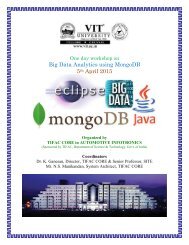
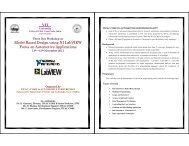
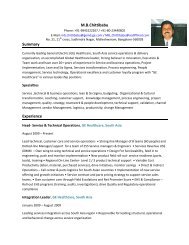
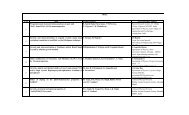

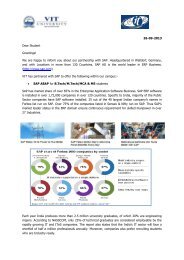
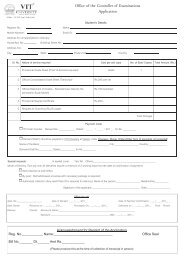
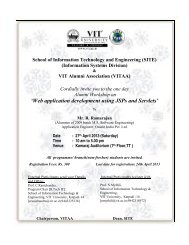
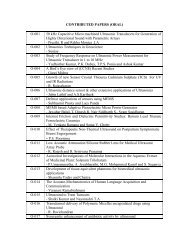
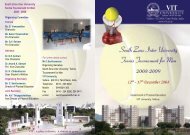


![[26th â 30th Oct 2009] - Result - VIT University](https://img.yumpu.com/48486076/1/184x260/26th-a-30th-oct-2009-result-vit-university.jpg?quality=85)
